My Fifth Rodeo in Davos: A Personal Take on Europe, AI, Preference Cascades, and Good Boots
For the fifth time, I joined the annual pilgrimage to Davos for the World Economic Forum—a place that, for one week, becomes half global policy shop and half high-stakes networking bonanza. Every time I come, I’m struck by how fun and interesting it is when you find the right people and events. Each year I get better at making my schedule and selecting the most important things to attend. This year was the best one yet.
The Big Rightward Shift (or: Watching a Preference Cascade in Action)
One of the most fascinating undercurrents I witnessed was this sense that we’re living in a gigantic preference cascade—those moments when people realize they’re not alone in their beliefs and start voicing them openly. This started to become clear after the presidential election last year. Voters in New York City thought they were the only ones who supported Trump, only to see him collect so many votes. They realized that they were not the only ones who felt the way they did. Marc Andreessen first identified this and I think it is the most important theme of the current moment.
WEF has a reputation for being very woke and globalist. Most people who have never gone assume that it is just Greta telling everyone to eat grasshoppers. I think that has always been inaccurate, but even more so this year. I didn’t meet a single person who admitted that they voted for Kamala. I met many people who had attended the inauguration and then flew to Davos right after. I saw MAGA hats in various colors. It was like a massive Trump rally without Trump present. Even the Europeans were talking about how much they wished they had a leader like him. I’m sure some of it is that they sense that he is having a moment and they want to be aligned with that. But it was quite staggering how much the vibe at WEF shifted rightwards.
Europe’s Big Problem: Where’s the Innovation?
It was impossible to miss the sense that Europe is stuck. People were talking in slightly hushed, worried tones—like they’d realized the party’s over but haven’t yet decided on a new DJ. The main idea is that Europe hasn’t built a strong culture of innovation. Meanwhile, the U.S. has been worshipping at the altar of new ideas for decades, and it shows: the U.S. economy is growing, while Europe is languishing. I wrote about this in my essay in November, and it seemed like everyone had read it before WEF (I wish they had).
Germany, as the heavyweight champion of Europe’s economy, came under special scrutiny. They’re in this awkward position of depending on Russia for energy and China for exports. They’re getting squeezed on both sides—and that’s not a comfortable spot for the largest economy on the continent. Also front and center was the complaint that Europe, as a whole, feels over-regulated. This sense of “bureaucracy over breakthroughs” is something I wrote about last November, and Davos only confirmed it. No one mentioned Thierry Breton by name, but the frustration with European red tape was loud and clear.
AI: The Trendy Topic Du Jour
There is always one super-trendy thing at Davos. A few years ago, it was blockchain. Then we had a wave of talk about KYC regulations. This year, the obsession was AI, including “responsible AI,”. On practically every panel, someone stood up to say we should put guardrails on AI development or keep a “kill switch” handy. In my view, that talk is mostly nonsense. Anyone pounding the table for stifling AI progress or for building complicated bureaucratic constraints around it might be well-intentioned, but they end up sounding like they want some Soviet-style committee to sign off on every line of code. I immediately discount anyone advocating for these policies as a stupid communist.
If you go to Davos often enough, you get used to these cyclical obsessions. I remember in 2019, blockchain was all the rage—people made it sound like the world would revolve around distributed ledgers forevermore. Flash forward to now, and I don’t think I heard the word “blockchain” once this entire week. Trends rise and then revert to the mean—and we’ll see if AI breaks that pattern or follows the same path.
People, People, and More People (Plus a Word on “AI Startups”)
As always, the best part of WEF is the people. I have an annual reunion with my buddy Olaf, who shares an apartment with me each time. It’s a bro-y environment for sure—there just aren’t as many women in attendance. And to be blunt, a noticeable contingent of the women there seem…well, suspect. A lot of the women are Ukrainians who all claim to have an “AI startup”. Back in 2019, they all had “blockchain startups” that sounded equally dubious). Let’s just say they appear to be in a different line of business.
Beyond that small portion of questionable encounters, the networking is unmatched. I ran into a friend who also went to the All-In Summit in September, and while that was nice, it doesn’t hold a candle to Davos in terms of unplanned, serendipitous conversations. No matter how expensive or crazy the logistics, I keep coming back, and I can’t imagine skipping in the future.
Two WEFs
There are essentially two WEFs. There always are. One is the politicians who congregate in the Congress Center. This requires a white badge to attend – which means your organization must be a member of the Forum (which costs between $200k and $800k) and then the badge itself is about $60k. But in the Congress Center is nothing of relevance to me. I don’t care about meeting the Uganda Environmental Minister or whatever. That is just nothing. A bunch of bureaucrats who aren’t accomplishing anything of relevance to me. The other WEF is the action on the promenade, where all the corporations have lounges. This is where all the people in business gather during the day for meetings and at night for dinners and parties. The badge required to access this is called a Hotel Badge and it only costs about $1,000.
Mind-Blowing Speakers (and Some Duds)
I went to an event Monday night featuring big names like Niall Ferguson, Martin Wolf, Nouriel Roubini, and Pano Kanelos. Niall Ferguson was razor-sharp and left me scribbling notes the whole time. Martin Wolf, on the other hand, sounded like he was rehashing old lines that might have been edgy in the 1980s. Time to take Martin out back and shoot him. Pano Kanelos – the founder of the University of Austin, that new venture Bari Weiss helped create – was also on the panel. He made a great impression. I’m rooting for them to succeed, although who knows if they’ll attract enough students to put themselves on the map.
The highlight of the week was seeing Javier Milei speak at the Bloomberg House. I remember when I was a kid and my parents would talk about seeing JFK speak and that they were crying because they were so moved. I didn’t understand it at the time. But I sure get it now. I was overcome with emotion seeing Milei speak. I’m not Argentinian and I have no connection to the country. I have never visited there. But seeing a leader like him filled me with such hope for the future. He was brilliant, immersed in the details, and so charismatic. It was incredible. Now I want to visit Argentina and show my support for their economy.
My Fifth Time Speaking at Davos
I gave a talk on Thursday. I was going to give a talk on serious stuff – converting the essay I wrote last month about decision-making and logical errors into a talkurpo. But then I decided that was boring and everyone else was talking about serious stuff. So I gave a talk about a much more interesting topic that I am passionate about – Running. I did an Ignite Talk (full video to come soon). I then led a group run in Davos which even had a sponsorship from TrackCred.
A New Addition to My Wardrobe: Boots
In years past, I always wore a fresh pair of Air Jordan sneakers, just to give Davos a little splash of color. But Olaf teased me and said I looked like a kid, so I switched gears. This time, I bought a pair of boots and fell in love with them. Consider me a boot guy now. Perhaps it’s part of my brand re-invention (next year maybe I’ll go all-in with a cowboy hat, who knows).
Racing, Coinbase, and Other Fun Tidbits
CEO of McLaren Racing (WSJ Event): He told this wild story about how he won money on Wheel of Fortune as a kid, got to pick from backstage prizes, chose a pair of Cartier watches, sold them at a pawn shop, and used the cash to buy his first go-kart. Talk about bold moves.
Brian Armstrong (Coinbase): I got to see him speak, and he’s a sharp guy—very impressive. This only strengthened my bullishness on Coinbase.
Quiet on Palestine, Loud on Support for Israel: Surprisingly, I saw no protests about Palestine. Meanwhile, plenty of people wore yellow ribbon pins and openly identified as Jewish. Remember – these people are noisy but they have no power.
Vlad Klitschko: I met him. He’s huge. That’s all. (But worth noting—very friendly, too!)
Audrey Tang (Kosova House): Brilliant. I first heard Audrey on a Tyler Cowen podcast a few years ago, and they did not disappoint in person. The idea of a government official in Taiwan being so tech-savvy is refreshing.
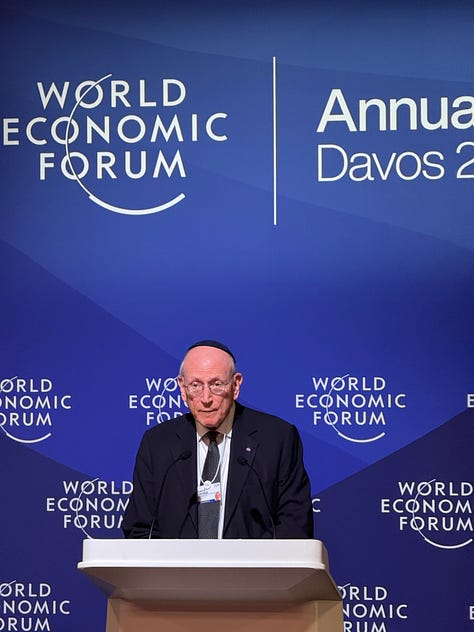
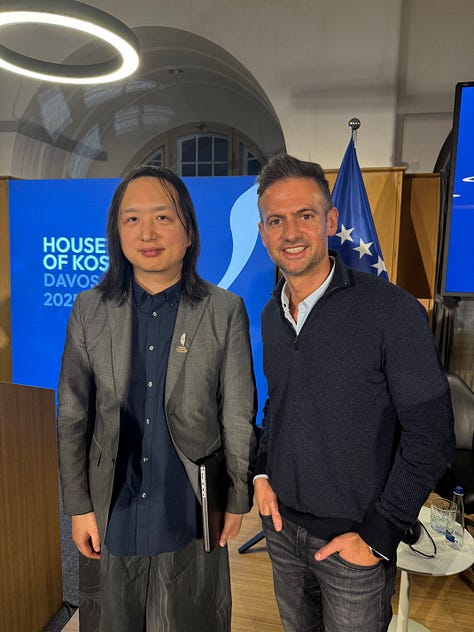
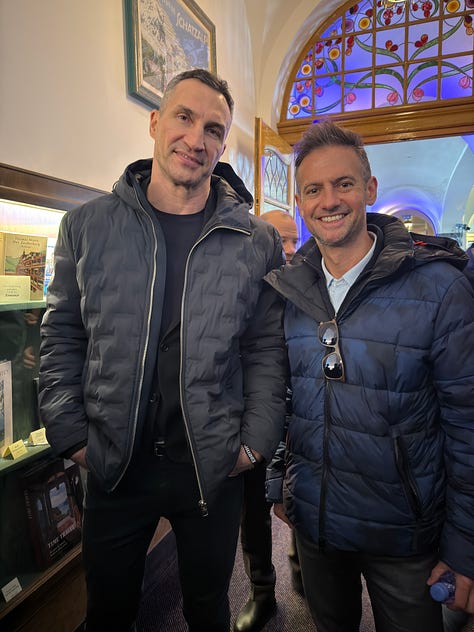
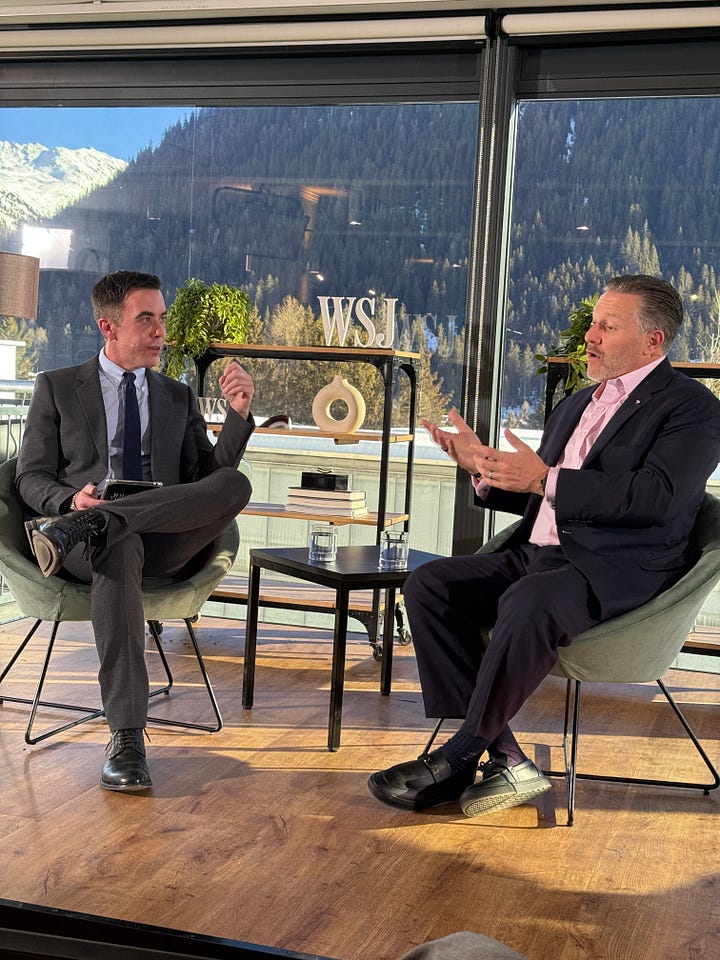
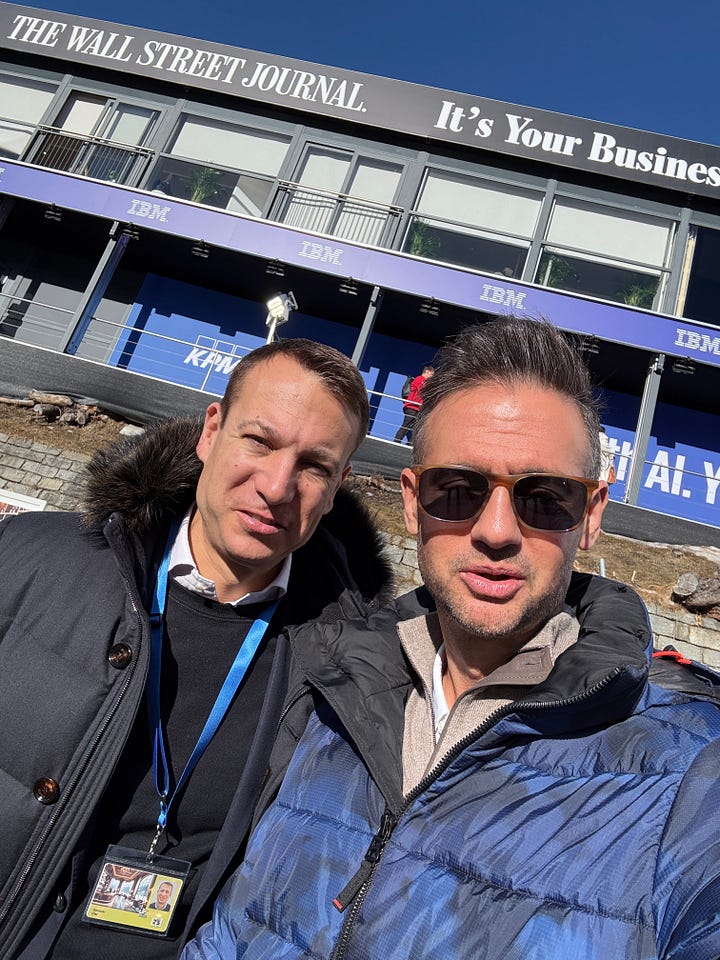
Rabbi Abraham Berkowitz’s Annual Shabbat Dinner
The annual Shabbat dinner hosted by Rabbi Abraham Berkowitz is always incredible. This year’s was as well. Stuart Eizenstat always gives a dvar torah and his talk this year was about antisemitism. If you’re interested in hearing the whole thing I have an audio recording of it that I can share.
Final Thoughts
Davos is both exhilarating and exhausting. You meet everyone from top-tier CEOs to random lounge hoppers who apparently forgot to pack business cards (yet still swear they’re about to disrupt entire industries). You trudge through the snow from one event to another, sometimes in a brand-new pair of boots (score!). And you keep coming back because there’s truly no better place on the planet to collide with so many interesting people, ideas, and, yes, occasional nonsense trends.
If there’s one big takeaway for me this year, it’s that the world is changing fast, and not always in the ways people expect. Europe is worried. AI is a big new obsession. Global political alignments are shifting like crazy, and preference cascades can happen in a blink. But under all that, the real point of Davos remains: forging connections, sharing big visions (or big illusions), and occasionally dropping into a conversation that makes you question or redefine what you’ve always assumed.
And for the record? I’m packing those boots next year. I think they’re here to stay.

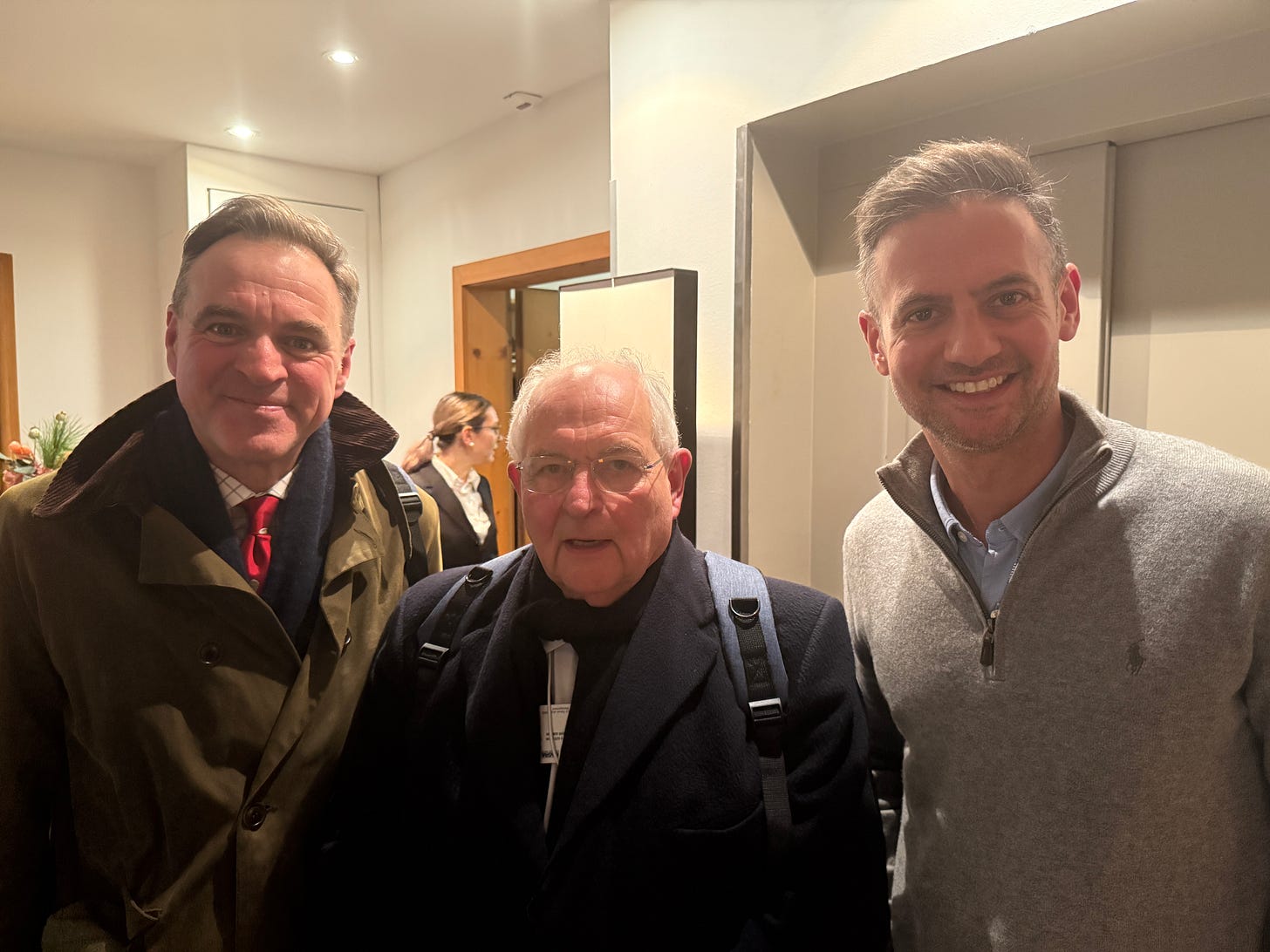
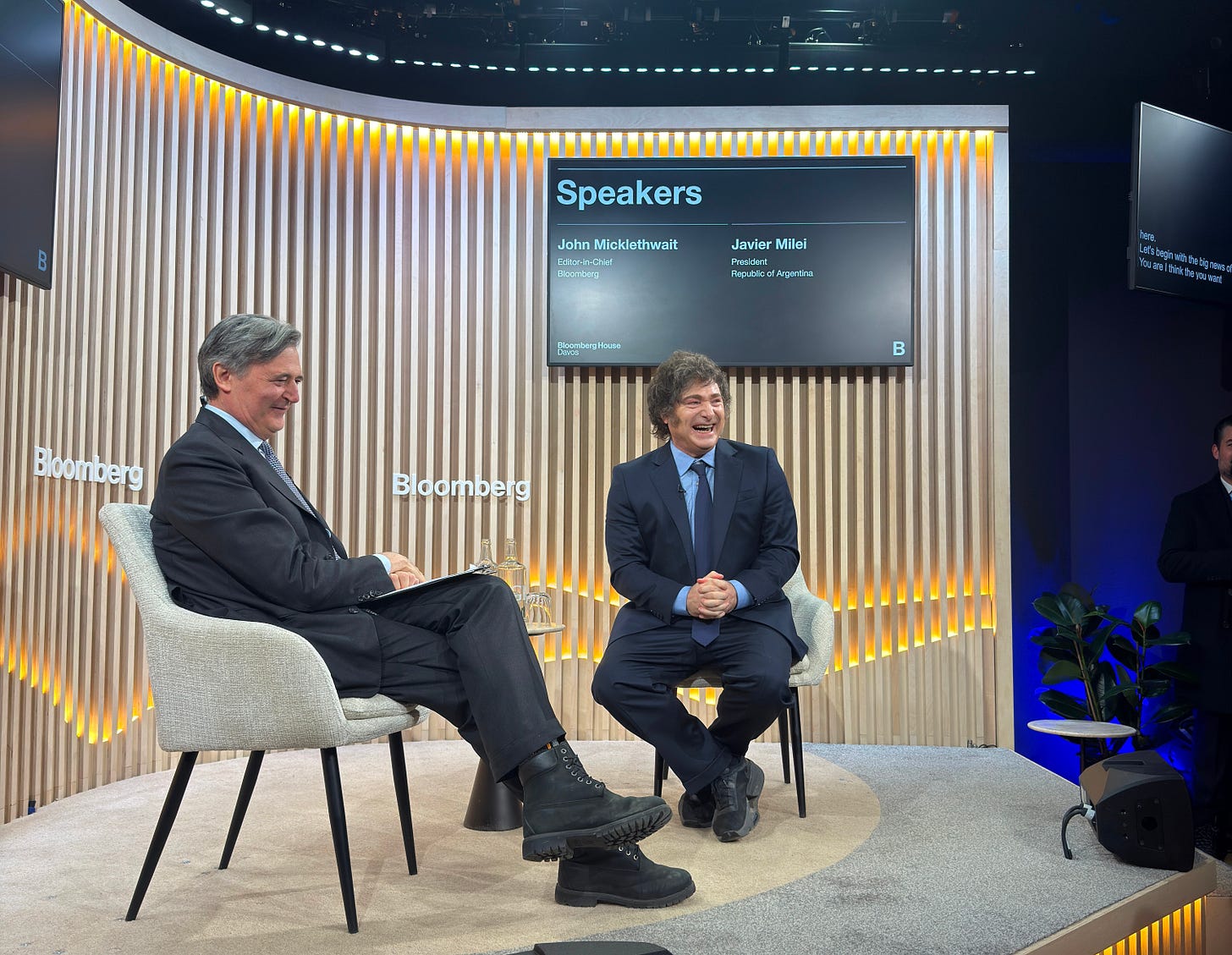
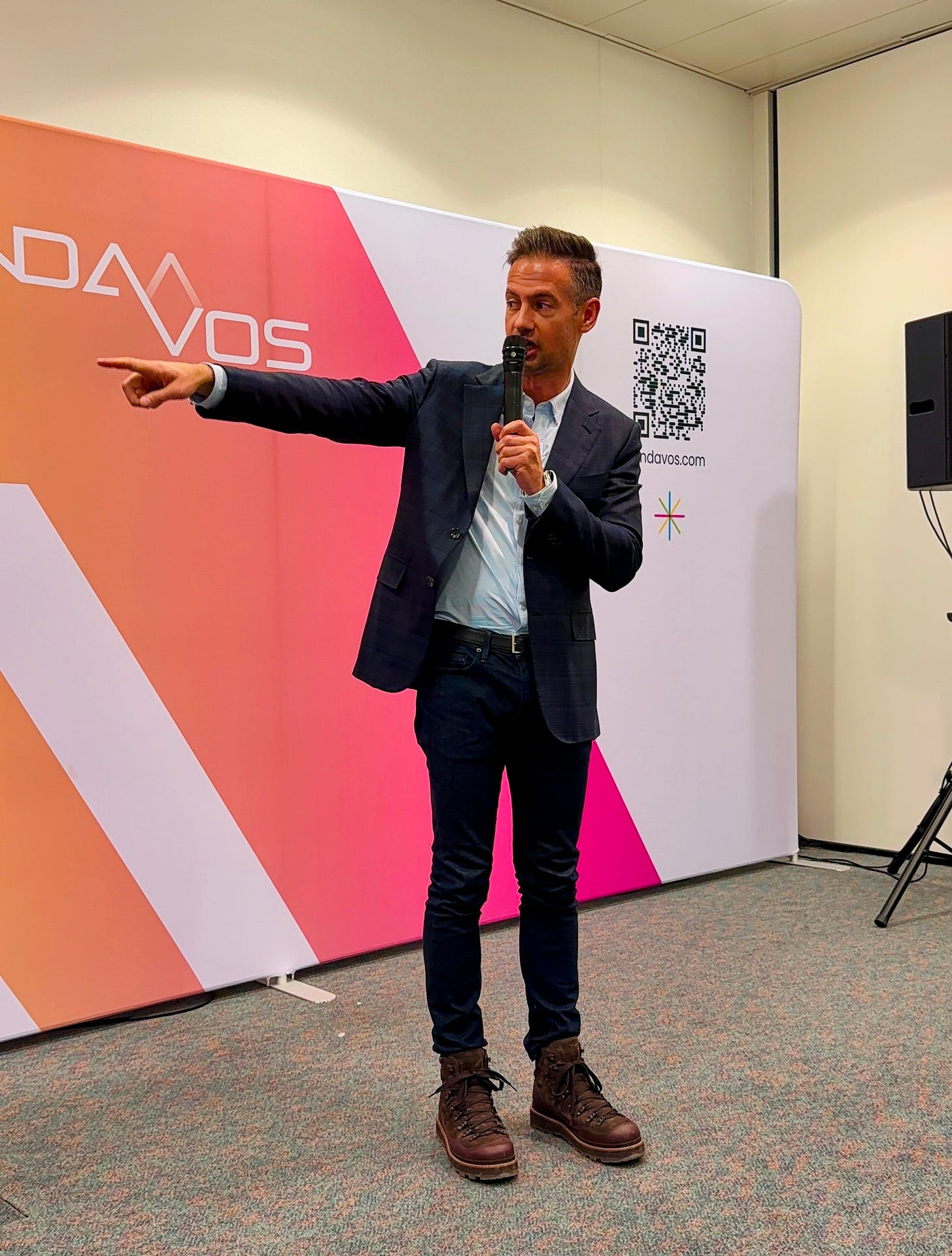
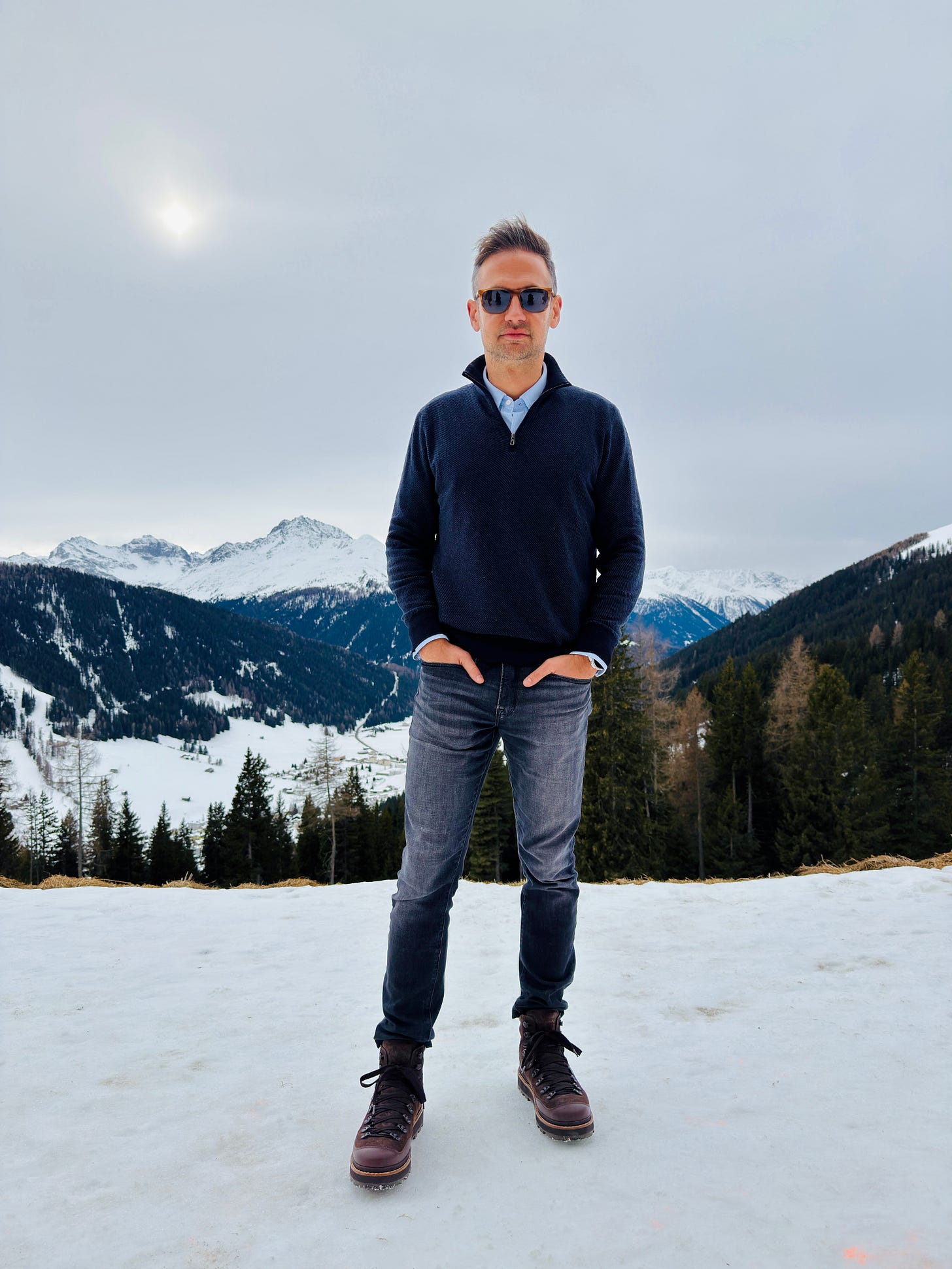
It’s always a pleasure and honor riding with you, my friend!!
If Kamala had gotten 1% more of the vote and won, do you think the vibe shift would have happened?